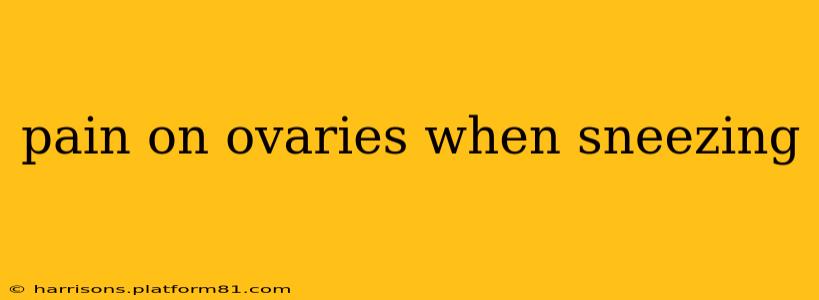Experiencing pain in your ovaries when you sneeze might seem unusual, but it's a more common experience than you might think. This sharp, stabbing, or aching sensation isn't usually a cause for major concern, but understanding the underlying reasons can help alleviate anxiety and inform appropriate action. This article explores the various reasons why you might feel ovarian pain when sneezing, offering insights and advice on when to seek professional medical attention.
Why Does Sneezing Cause Ovarian Pain?
The connection between sneezing and ovarian pain often boils down to the sudden increase in abdominal pressure. When you sneeze, your abdominal muscles contract forcefully, increasing pressure within your abdomen. This pressure can affect various organs, including your ovaries.
Here's a breakdown of the potential mechanisms:
- Pressure on Sensitive Tissues: The ovaries are surrounded by delicate ligaments and tissues. The sudden pressure surge from a sneeze can stretch or irritate these tissues, causing pain. This is particularly true if you already have underlying conditions affecting these areas.
- Endometriosis: In individuals with endometriosis, where uterine tissue grows outside the uterus, sneezing can exacerbate existing inflammation and pain. The increased pressure can put pressure on endometrial implants, leading to discomfort.
- Ovarian Cysts: If you have an ovarian cyst, sneezing can cause it to shift or put pressure on surrounding nerves, resulting in pain. The pain can range from mild discomfort to severe sharp pain, depending on the size and location of the cyst.
- Pelvic Inflammatory Disease (PID): PID is an infection of the female reproductive organs. The increased abdominal pressure from sneezing can aggravate the inflammation and infection, leading to pain in the ovaries.
- Ectopic Pregnancy: While rare, a sneeze could cause pain in an ectopic pregnancy (where a fertilized egg implants outside the uterus). However, ectopic pregnancies typically present with more significant and persistent symptoms beyond just sneezing-related pain. This is a medical emergency, requiring immediate medical attention.
What If the Pain is Severe or Persistent?
While occasional ovarian pain during sneezing is often benign, persistent or severe pain warrants a visit to your doctor or gynecologist. The pain could indicate a more serious underlying issue requiring diagnosis and treatment.
Can Certain Medical Conditions Cause Ovarian Pain During Sneezing?
Yes, several medical conditions can heighten the sensitivity of your ovaries and make sneezing more painful. As mentioned above, endometriosis, ovarian cysts, PID, and ectopic pregnancy are prime examples. Other conditions involving inflammation or irritation in the pelvic region could also play a role.
When Should I See a Doctor About Ovarian Pain?
It's important to seek medical advice if:
- The pain is severe or debilitating.
- The pain is persistent and doesn't subside.
- You experience other symptoms like fever, vaginal discharge, or heavy bleeding.
- You suspect you might be pregnant.
Don't hesitate to contact your doctor if you have any concerns. Early diagnosis and treatment are crucial for managing potential underlying health issues.
Is there a way to reduce ovarian pain when sneezing?
There isn't a foolproof method to eliminate pain entirely, but you can try these strategies to minimize discomfort:
- Support your abdomen: Gently supporting your abdomen with your hands while sneezing can help reduce the sudden pressure surge.
- Gentle stretching: Regular gentle stretching exercises can improve flexibility and reduce tension in your pelvic muscles, potentially minimizing pain.
- Pain relief: Over-the-counter pain relievers like ibuprofen or acetaminophen might offer temporary relief from mild pain. Always consult your doctor before starting any new medication.
Conclusion
Experiencing pain in your ovaries when sneezing is often a temporary and relatively benign issue related to the increase in abdominal pressure. However, understanding potential underlying causes and seeking medical attention when necessary is crucial for maintaining good reproductive health. Remember, this information is for educational purposes only and doesn't replace professional medical advice. Always consult your doctor for any health concerns.
